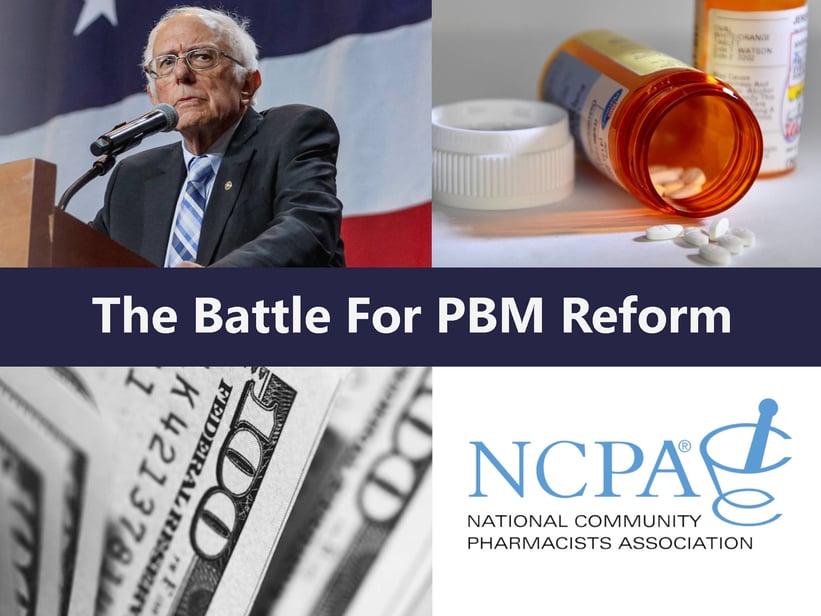
Pharmacy benefits managers (PBMs) have long been the “pharma fat cats” that independent pharmacists love to hate. But now the much-maligned middlemen find themselves in the crosshairs of not one, but two bipartisan reform efforts in Congress – each vying to destroy the more egregious facets of PBMs’ business model in an effort to reduce the cost of prescription drugs.
Sanders/Cassidy to Ban Spread Pricing
Making the most noise is a bipartisan package of four bills sponsored by Sens. Bernie Sanders (I-VT) and Bill Cassidy (R-LA). The reforms are designed to lower prescription drug prices and increase access to generic drugs. Specifically, the legislation would:
- require PBMs to pass along 100% of rebates they receive from drugmakers to health plans and employer;
- ban spread pricing, a practice in which PBMs charge health plans more for a drug than they paid the drug manufacturer;
- increase transparency for PBM pricing and practices; and
- make it easier for consumers to switch to generic drugs.
The package recently cleared the Senate Health, Education, Labor, and Pensions (HELP) Committee, which Sanders chairs. Cassidy is HELP’s ranking Republican member.
The reforms are "a major step forward in the fight to lower prescription drug prices," Sanders said. "PBMs have been exploiting their monopoly power to overcharge consumers and drive up the cost of prescription drugs."
Cassidy said the reforms are "a common-sense approach to lowering prescription drug prices," adding that "these reforms will help to ensure that consumers get the best possible deal on their medications."
NCPA: Not so Fast…
The reforms are supported by a broad coalition of consumer groups, patient advocates, and healthcare organizations. However, the National Community Pharmacists Association (NCPA) and other pharmacy groups expressed mixed reactions to Sanders’ and Cassidy’s package.
“We are appreciative of all congressional efforts to rein in abusive practices that harm patients and the pharmacies that serve them,” wrote NCPA, in a joint letter with the American Pharmacists Association, the National Association of Chain Drug Stores and other grocery & drugstore advocacy groups. “However, we have serious concerns that the draft for consideration by the committee will have the unintended consequence of negatively impacting the ability of states to retain their regulatory authority over PBMs. Congress passing laws that could nullify these victories or lead to additional litigation, burying states in lawsuits, is a major concern for states, pharmacists, pharmacies, and patients.”
The letter noted that many states have won hard-fought legal battles against PBMs over the last 10 years in a number of court cases, including Rutledge v. PCMA. The groups urged the Senators to adopt a provision that includes strong non-preemption language so that nothing in the federal legislation “could be construed to preempt State laws more protective of health plans, patients, pharmacists, and pharmacies in their interactions with pharmacy benefit managers.”
Cantwell/Grassley Push Transparency
Meanwhile, the NCPA lauded a pair of bills introduced recently by Sens. Maria Cantwell (D-WA) and Charles Grassley (R-IA): S. 113, known as the Prescription Pricing for the People Act; and S. 127, dubbed the PBM Transparency Act.
Collectively, these bills clarify the enforcement authority of the Federal Trade Commission (FTC) and other state agencies to bring action against PBM practices that drive up the cost of prescription drugs, and ensure that the FTC completes its investigation into PBM’s anti-competitive behaviors.
Specifically, the two bills:
- ban deceptive unfair pricing schemes;
- prohibit arbitrary clawbacks of payments made to pharmacies;
- hold PBMs accountable for unfair and deceptive practices that drive up the costs of prescription drugs at the expense of consumers;
- require PBMs to report to the FTC how much money they make through spread pricing and pharmacy fees;
- set a deadline for the FTC to complete its 6(b) study into PBM behaviors; and
- give the FTC and state attorneys general the ability to penalize and/or initiate legal action against PBMs in the commercial health insurance market.
PBMs Fight Back Against “Big Power”?
The proposed reform measures have already drawn fierce opposition from the PBM industry. In late May, the Pharmaceutical Care Management Association (PCMA) announced the launch of a new seven-figure advertising campaign, targeted to Washington DC and selected states. The campaign includes video ads with titles such as “Big Power” and “The Scheme,” which attempt to cast PBMs as the victims of a Big Pharma campaign to keep drug prices high by targeting cost-saving pharmacy benefits.
“Congress must reject these efforts to divert attention away from drug companies’ pricing decisions and resist legislation that would limit pharmacy benefits, legislation that the pharma lobby is trying to position as a solve-all to make prescription drugs more affordable,” said PCMA CEO, JC Scott. “Misguided proposals targeting pharmacy benefits come straight from their playbook and are designed to undermine the one check-and-balance on drug companies’ pricing power.”
The PBM reform battle promises to be a protracted fight. We’ll keep you posted. Meanwhile, in another price-gouging scheme that has drawn bipartisan ire, PBMs are attempting to pass the blame on the high cost of insulin. Stay tuned!







.png)


